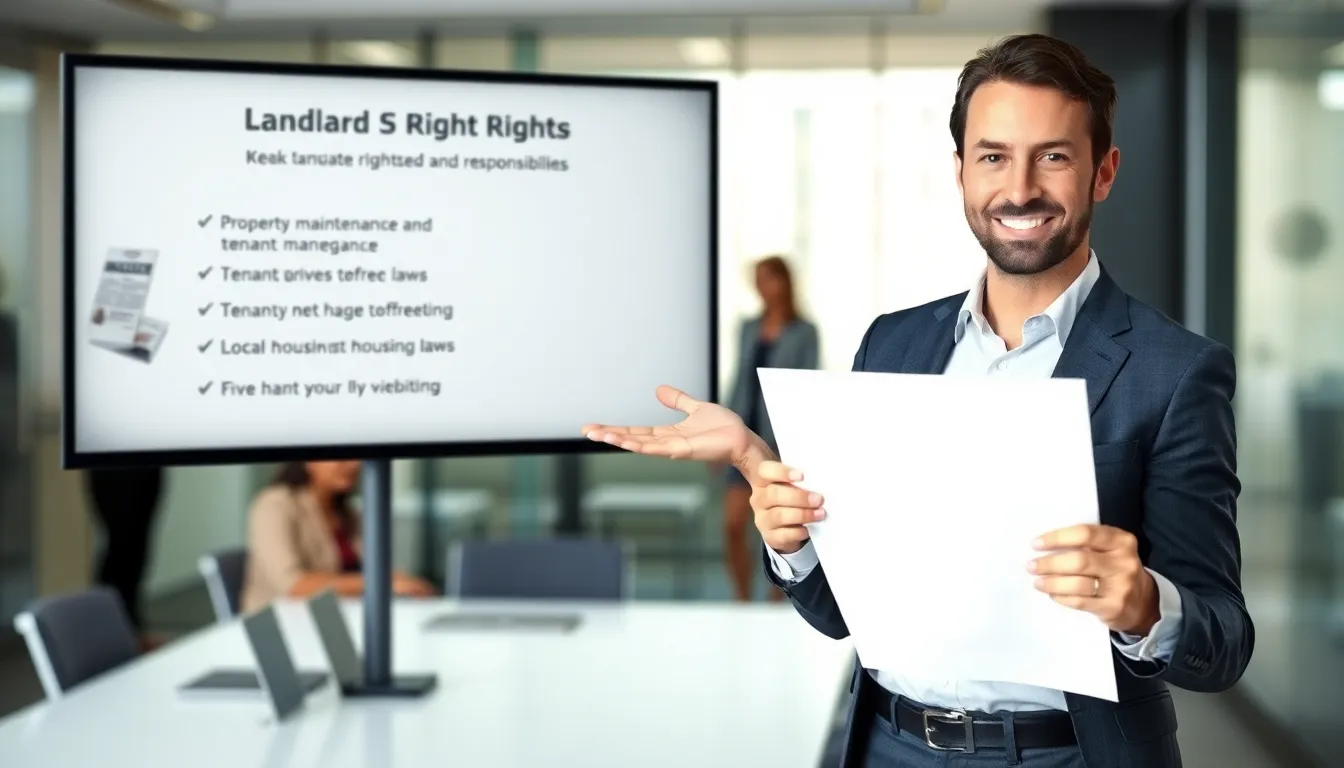Navigating the world of property management can feel like trying to find your way out of a corn maze, stressing, confusing, and full of dead ends. For landlords, knowing your rights and standing your ground is crucial, yet many often feel lost in a sea of legal jargon and tenant troubles. Fear not. This guide is your trusty map, offering free landlord advice that is clear, actionable, and just a touch humorous. After all, maintaining a sense of humor might just keep the headaches at bay. So, let’s jump into the essentials that will turn your property management woes into a smooth, efficient operation.
Table of Contents
ToggleUnderstanding Your Rights and Responsibilities

Every landlord must familiarize themselves with both rights and responsibilities. This foundational knowledge serves as a shield against misunderstanding and legal disputes.
Firstly, landlords have the right to charge rent, set rules for tenants, and enter the property in emergencies. But, these rights come with significant responsibilities. For instance, maintaining the property, ensuring it is habitable, and respecting tenants’ privacy are pivotal.
Besides, understanding local housing laws can be a game-changer. From fair housing regulations to safety codes, these laws vary by state and often entail hefty penalties for non-compliance. So, landlords should either attend workshops or consult legal professionals to stay well-informed.
Finally, keeping comprehensive records about tenant interactions, repairs, and payments can avoid future misunderstandings. This documentation acts as a powerful ally should disputes arise.
Common Legal Issues Landlords Face
Stepping into the role of landlord is synonymous with stepping into the legal minefield known as rental property management. One common issue is tenant eviction. While it’s essential to handle this delicately, the law provides a strict process. A landlord cannot simply kick out a tenant without following the established eviction procedures, which usually require a notice period and a valid reason, such as non-payment of rent.
Another frequent strife involves security deposits. Often, disputes arise over how much can be withheld at the end of a tenancy. Most local laws require landlords to return security deposits within a specific timeframe, minus reasonable deductions for damage beyond normal wear and tear. Communicating clearly with tenants about this can mitigate misunderstandings.
Discrimination claims also pose a significant risk. Landlords must comply with the Fair Housing Act, which prohibits discriminating against tenants based on race, gender, religion, and several other factors. Failing to adhere to this can lead to costly litigation. Hence, educating yourself on fair housing laws is not just wise: it’s essential.
Effective Tenant Communication Strategies
Open, effective communication serves as the glue that holds a successful landlord-tenant relationship together. One strategy is to set clear expectations from the outset. During the lease signing, elucidate all rules concerning noise, pets, and property maintenance. Both parties should clearly understand their rights and what to expect during the tenancy.
Regular communication is essential too. Sending monthly updates or newsletters can inform tenants about routine maintenance schedules, community events, or changes in rental policies. This proactive approach can help foster a sense of community and can yield positive relationships.
Finally, being approachable is key. Many tenants prefer to address concerns directly rather than submit a complaint via email or text. Encouraging tenants to speak up about issues promptly can prevent small problems from blooming into larger disputes.
Maintenance and Property Management Tips
Maintenance is the engine that keeps a property running smoothly. Scheduling regular inspections not only ensures that the property stays in compliance with health and safety codes but helps identify potential issues before they snowball into costly repairs.
Also, establishing a clear system for reporting maintenance problems can streamline management. Create a designated email address or phone number solely for repairs. This way, tenants know exactly where to direct their concerns, and landlords can easily track requests and responses.
Also, it’s wise to develop relationships with trusted contractors. Having a go-to list of reliable service providers can expedite repairs and eventually boost tenant satisfaction. Keeping a property well-maintained fosters a positive living experience for tenants and enhances the value of the investment.
Resources for Landlords
Navigating the landscape of landlord responsibilities often feels like a challenging job. Thankfully, numerous resources are available to streamline this venture. The American Apartment Owners Association (AAOA) provides accessible webinars, legal forms, and expert advice tailored for landlords of all experience levels.
Local landlord associations often host workshops covering legal changes, rental property management best practices, and networking opportunities. Joining these groups can be invaluable for sharing insights and tips with fellow landlords.
Also, online forums and social media groups can serve as excellent platforms for seeking advice. Websites like LandlordStation and BiggerPockets allow landlords to discuss challenges and solutions in real-time, ensuring no one feels alone in this multifaceted role.



